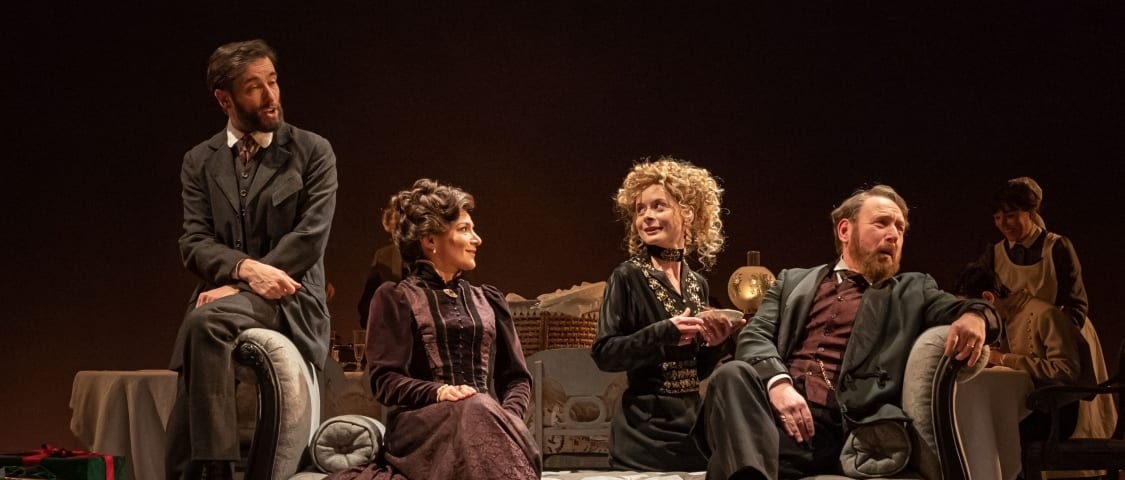Rather like Polanski’s Chinatown, this play is something of a misnomer. Just as hardly any of that famous film takes place in the Chinatown of Los Angeles, so the old Jewish quarter of Vienna – Leopoldstadt – may be where this Jewish family stems from and ultimately ends up, but the action of the play takes place elsewhere. Rather this is a series of snapshots between 1899 and 1955 of an extended Jewish family that has succeeded in moving up in the world and then has to navigate the dislocations and destruction of Austrian life and their own world in the twentieth century. The first half, which focuses exclusively on the years 1899-1900, is very successful; whereas the second, which examines key episodes from 1924, 1938 and 1955, is perhaps less convincing, despite the fact that the quality of the ensemble acting from a very large and individually faultless cast is the best in London since The Inheritance.
Stoppard has translated Schnitzler before and is very much at home in the world of Vienna 1900 – the world and indeed works of Freud, Mahler, Herzl, Klimt and Schnitzler are effortlessly woven together here within a family narrative on a grand scale. The balance is just right between intellectual exposition and debate and broader character development. There is also a warmth and tenderness in the writing that is not always present in this author. What we experience is a very successful study of the boundaries and possibilities of integration and assimilation: a unique milieu which offered great opportunities for Jewish entrepreneurs and creative figures but within a framework of continuing ugly antisemitism.
The balance moves out of kilter in the second half where the choice of ‘litmus test’ dates is odd – why 1924 and 1955 rather than 1918 and 1945, for example? Certain key characters in the first half are oddly handled in the second, and given the scale of the cast, it is not immediately clear who originally seen as a child in one scene has become which adult in the next. Also the emotional pulse is weaker, despite the traumatic historic events depicted, because of Stoppard’s tendency to give us too much of an undigested history lesson rather than a full evocation of felt life. Perhaps the strongest scene is the final one where a young man, whose deracinated experience echoes Stoppard’s own, returns to Vienna and is forced to rediscover his roots.
The test of the durability of this play will in a sense be its second production rather this one. For the way in which it has been technically staged this time cannot be faulted. There is a huge cast to manoeuvre – up to 50 people, if you count all the alternate children in the most junior roles. Marber’s direction achieves great fluidity and animation in the crowded scenes of Christmas and ‘seder’ celebration, and a pared down economy of gesture and textual pointing in the more intimate encounters. This is echoed in the expert design by Richard Hudson, which takes the same luxurious apartment and then measures out the passage of time from the overbearing and overstuffed interiors of the ‘fin de siècle’ through to the stripped down bare essentials of Nazi occupation. Costumes similarly mutate with meticulous care through the decades, and the choice of music – especially Sibelius’ ‘Valse Triste’ – is spot-on, and all the more effective for avoiding obvious Viennese favourites.
It is invidious to turn the spotlight on individual performances given the aura created collectively, but one still has to note the skills of Adrian Scarborough as the patriarch entrepreneur Hermann Merz, torn between his cultural past and an acceptance in high society that is always out of reach. Also very impressive is Faye Castelow, as his gentile wife Gretl, whose fragile grip on reality slips by gradations from scene to scene. Among the younger members of the family Jenna Augen is outstanding as the immigrant to America who returns to gather up the pieces post-war’ and Luke Thallon distinguishes delightfully between two highly contrasted roles – a Austrian Don Juan full of reflexive anti-semitic superiority, and the naïve young Englishman returning clueless to his origins.
While there are some doubts about the choices made in the working out of the play, there can be none about the finesse and finish of this production. Given the scale of the piece, which means it will not return soon, and its valedictory nature within the author’s output, it should be a top recommendation to any serious playgoer.

